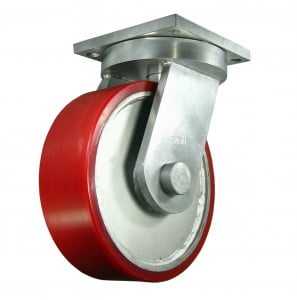A castor or castor wheels are undriven wheels designed to carry large objects (vehicles), enabling easy movement of the object or container. Castors can be found in many places like shopping carts, hospital beds, material handling equipment, office chairs etc. Though these wheels look the same, they serve different purposes in different areas.
There are different types of castors in various industries for various purposes. Each of these types serves different purposes. They are named differently as well.
The types of castors are:
- Plate Castors
- Locking Castors
- Stem Castors
- Hollow Kingpin Castors
- Rigid Castors
These types of castors function slightly differently in every industry. Each has a special place and function, making it easy for customers to buy it for a specific job. Buying them as per the requirement will give you the best result.
What are the wide ranges of materials used in castor wheels?
A wide range of raw materials is used in the manufacturing of wheels. Different materials are used for making the castor wheel for various purposes.
The materials used in manufacturing the wheels are:
- Puncture-proof foam
- Polypropylene
- Rubber steel
- Blue nylon
- Elastic rubber
- TPR Grey steel
- Pneumatic wheels
The wheels are manufactured to function in unique places and to survive the harsh conditions there. From the healthcare sector to the hot factories, these wheels are an essential item. Each of these industries needs specialised wheels for moving the loads and for other functions.
Each material is suited for a different type of industry, like mild steel or stainless steel is medium-duty castor. They can bear/carry weights from 100 to 250 kilogram. They are used in the medical sector, in labs, excellent rooms and many more similar areas.
High capacity loads require a puncture-proof wheel and solid nylon wheels, which offer excellent durability and ease in moving heavier loads.
For over 300kg and above, pneumatic wheels are considered ideal. They are usually seen in agricultural equipment like hand trolleys and wheelbarrows.
There are many other places in which these castors are used; they move the loads easy and fast.
Now that you know about the different types of castors in other places, the next step is to know which one to use/buy according to the floor, ground you are working on.
- For a plain floor, a solid nylon wheel is ideal. The load moves smoothly on uneven floors if you have nylon wheels.
- If the floor is uneven and has some obstructions, puncture-proof wheels or cast iron and SG iron wheels are ideal.
- If the temperature varies in your work environment, glass-filled nylon and high-temperature polymer wheels will be a great choice.
These castor wheels can ease up the movements in your business and finally improve the workers’ productivity. A slight change can make a massive difference in the output of a company.
Choosing a suitable castor for your work environment is the best thing you can do to improve and increase the ease of movement of loads in your manufacturing unit or factory. Each type of castor provides the solution needed for different floors and work environments. So, you should choose the right one for your business and boost up productivity in your industry.

